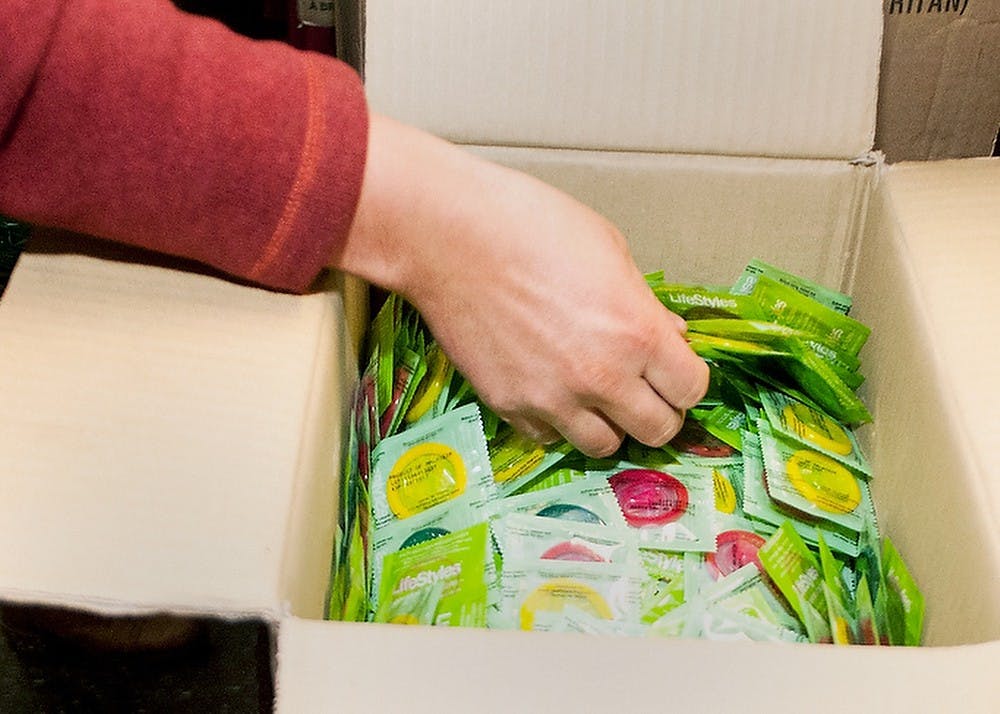One in two sexually active persons contract a sexually transmissible infection, or STI, by age 25, according to the American Sexual Health Association. And that data includes college students — the ASHA’s statistics show that young people, ages 15 to 24, account for half of new STI cases.
For MSU students seeking to maintain their sexual health and prevent contraction of STIs, one of the university’s most popular sexual wellness resources available is the Condom Connection — a program that provides free condoms to students living in residence halls.
Journalism junior and resident assistant Julian Mitchell offers condoms to students on his dormitory floor. Mitchell worked at The State News in fall 2016.
Through the program, all students can obtain condoms from their resident assistants and the Olin Health Center on campus.
“Obviously, we can’t force anything on residents like remaining abstinent … teaching them, rather than just trying to make them do one thing, is all very helpful,” Mitchell said. “With the Condom Connection, we can help give them resources they might need and then any information and help they might need as well.”
Mitchell said it’s important that the university spreads the word about campus resources aimed at promoting sexual health awareness.
“They could definitely work better at spreading out more information about some more resources on campus and sexual wellness as a whole,” Mitchell said. “You can get HIV screenings on campus as well as STI screenings, so spreading that information and information about healthy relationships is where sexual wellness all starts.”
Resident assistants like biomedical laboratory science senior Deborah Johnson aim to be the middlemen between students and those resources.
“I would rather have my residents practicing safe sex than having a pregnancy scare their freshman year,” Johnson said.
Johnson noted a difference in participation between female residents and male residents using the Condom Connection.
“I’ve noticed that the girls take them a lot less than the guys,” Johnson said. “I know that the male RAs — we had a big problem last year where they would run out of condoms really quickly.”
But Johnson’s goal is to create a judgement-free zone for all of her residents, regardless of gender.
“I would so much rather you feel that you could just grab the condoms and go … I don’t want anyone to feel uncomfortable getting them,” Johnson said. “If there was a possibility to take the stigma away, then it’s important to know that safety is the biggest concern here.”
Condom Connection is just the tip of the iceberg. More sexual wellness resources can be accessed at MSU’s Olin Health Center, where students can schedule anonymous HIV screenings, confidential STI testings and pregnancy tests.
And male contraception — like typical condoms — aren’t the only resources offered. Dental dams, female condoms and lubricant are available at the health center as well.
Olin Health Center’s website provides additional information about obtaining consent, using contraceptives, putting on a condom and maintaining healthy relationships.
As to the effectiveness of these campus programs and resources, students like hospitality business freshman Donald Buonavolanto said the options are extremely beneficial.
“The fact that they give them out for free is a good thing because you’re looking out for the other kids,” Buonavolanto said. “Say, if they forget, they’ll always have it because the RA’s giving them out.”
Economics sophomore Lee Borawski talked about the convenience and reliability of MSU’s sexual health resources for students in need.
“I would say that if somebody were actively seeking that type of information, I would probably refer them to on campus resources before I’d refer them to online resources,” Borawski said. “I just feel like it’s more relevant to have things that are designed directly to be for our students. I feel like it would be a little more tailored.”
Support student media!
Please consider donating to The State News and help fund the future of journalism.
Discussion
Share and discuss “Free resources, programs on campus work to end stigmas about sex ” on social media.







